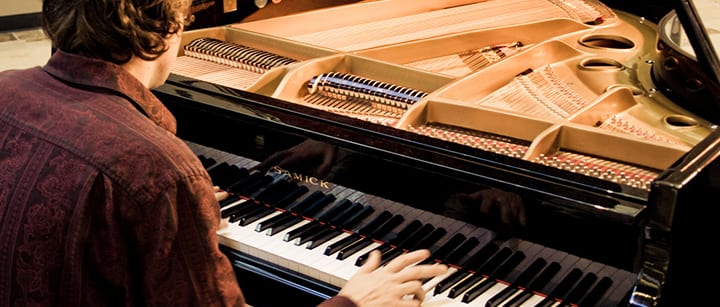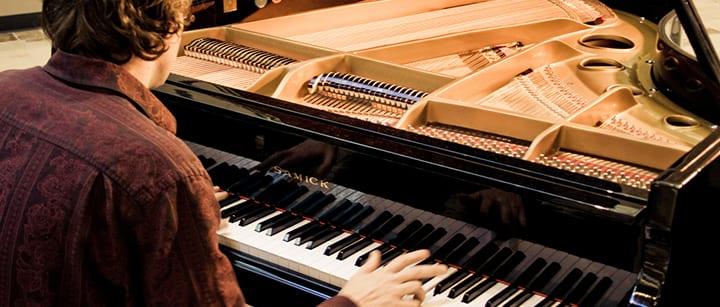 Have you ever wanted to learn the piano, but worried it’s too late? With all of your commitments at home, maybe you’re concerned you won’t be able to find the time to practice.
Have you ever wanted to learn the piano, but worried it’s too late? With all of your commitments at home, maybe you’re concerned you won’t be able to find the time to practice.
But if the passion is there, it’s time to stop the worrying! With a little patience and commitment, you can easily learn to play, and you’ll find that desire and discipline can go a long way. Everyone can find time in their day – or rearrange their day – so they can sit down and learn to play the piano.
Choosing the Right Equipment
First things first: learning piano will require an instrument! Many pianists prefer to use a traditional piano for the sound quality, while others prefer to use a keyboard. You might find, for example, that using a keyboard with headphones is more conducive to your environment. Headphones can be very helpful in blocking out distractions and increasing focus, and it won’t disrupt your family or the neighbors.
More equipment that can help:
-
A lift-up bench seat storage keeps piano books from cluttering your home
-
A metronome for keeping even timing
-
A planner or calendar for tracking practice times and upcoming lessons
Planning for Success
Are you wondering how in the world you will find time to practice amid all your other responsibilities? Playing the piano requires time and energy, which often calls for sacrifices. Some adults don’t even want to get started because of their busy lifestyle; others start up and practice for a short time before letting it go again. Don’t let this happen to you!
Like anything else, you can find time for learning piano if it is important to you. Before you even begin with basic lessons, look for the songs and music styles that inspire you. Create a Pandora station or write down song titles that you love. This will give your teacher a good understanding of how to best help you get where you want to be. Your teacher will be able to incorporate your favorite music in your lessons as quickly as possible and help you learn the styles and songs you love. Having a goal will also keep you on track when you feel tired of practicing or discouraged at the clumsiness of your beginner fingers!
Finding a Teacher
Have you looked up how-to videos on YouTube, searched for piano tutorials online, or purchased piano learning software? These resources may give you something to work on, but you run the risk of establishing bad habits – plus, you might end up pacing yourself incorrectly as you move through learning the different fingerings and techniques involved.
From proper posture to correct fingering, taking piano lessons will give you the one-on-one instruction you need to reach your goals faster and better. You’ll learn how to read music, not just play one or two songs. When you are feeling frustrated or overwhelmed, your teacher will be there to listen and give you helpful instruction. Plus, with someone holding you accountable, you’ll be much more likely to stick with your practice schedule!
Finding the Time for Learning Piano
You might have to make some compromises to fit in solid practice time in every day. Here are some tips for making the most of your time and creating time to practice, despite your busy lifestyle:
- Cut the TV – You might be surprised how distracting the TV is, even if it’s only on as background noise. Turn off the TV until your work is done.
- Delegation – Is there anything you can have done for you to free up extra time to practice? Hiring a cleaning service once a week, for example, will cut out some of the time spent on housework and could be very affordable. Having your children help out more around the house, finding a designated driver to take your children to activities, picking up a pre-made meal once or twice a week – there are many ways to get help with accomplishing necessary (but time-consuming) tasks.
- Try shorter practice sessions – Rather than try to fit in one long practice session, try breaking it into short segments. A few 10- or 20-minute sessions might be more realistic throughout your day, as opposed to an hour of concentrated work.
- Adjust your mindset – Remember, the piano is something you have a passion for! While practicing is seldom fun, try reminding yourself of why you started in the first place. Consider it a scheduled leisure activity, and you’ll start to really enjoy practicing!
- Plan with your teacher – A private piano teacher can be a great source of accountability and support, but they should also be flexible enough to accommodate your schedule. If you know a particularly busy time (like the holidays, for example) is coming up, then talk to your teacher about reducing the workload during that time so can adequately practice your assignments.
- Set a practice timer – Don’t just estimate how long you’ve practiced! Instead, actually set a timer and make sure you stay focused for the entire time. And make sure your family or roommates knows to leave you alone during this time!
Your success in learning piano lies in both practice and dedication. Just like almost anything worth doing, learning piano will take time – but it’s certainly worth it! Figure out what works best for you, and stick with it!
Photo by Kevin Ohlin
Suzy S.

